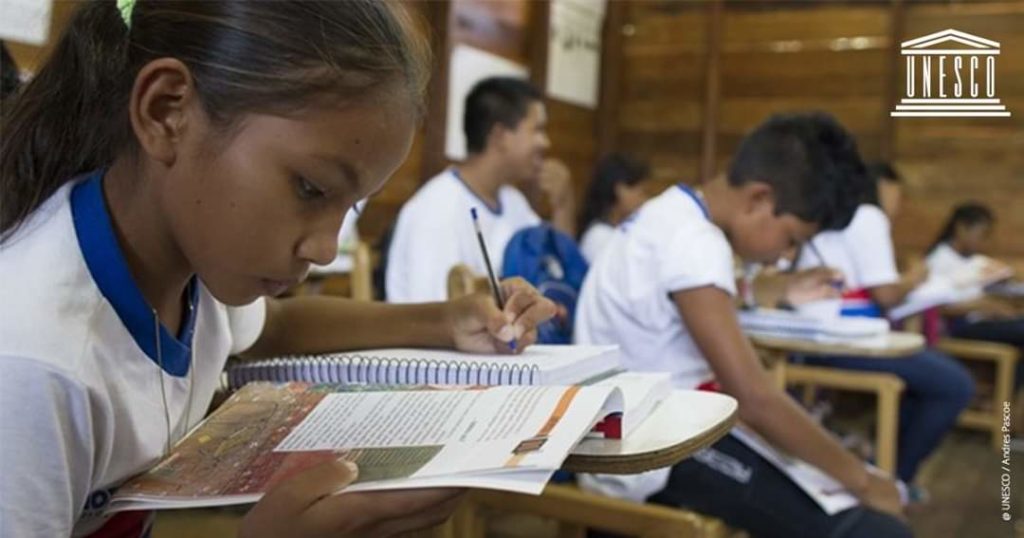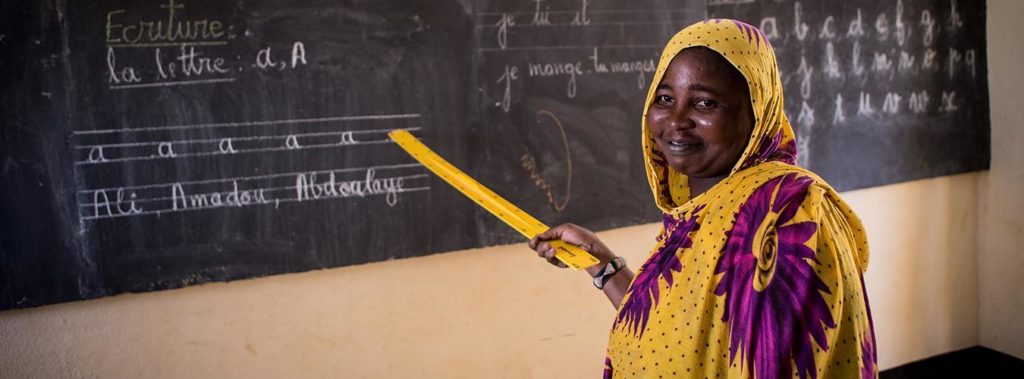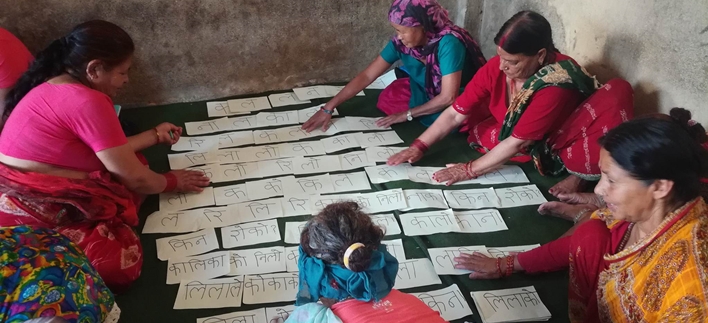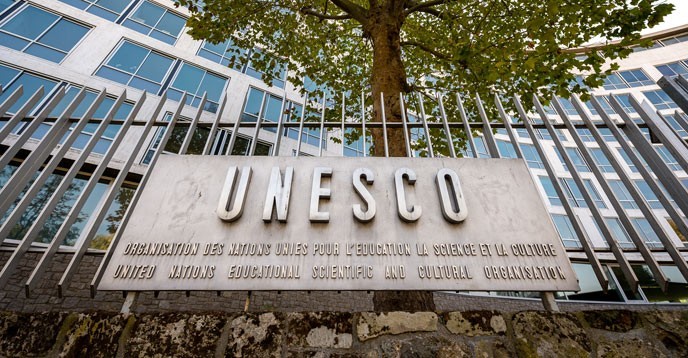Blog of Evelyne Para, SI UN Representative at the United Nations Educational, Scientific, and Cultural Organisation (UNESCO).
“In the midst of the global COVID-19 crisis, International Literacy Day celebrated on September 8, was an opportunity to recall the crucial importance of literacy for the greatest number of people, leaving no one behind, if we want to reinvent a world of hope.
Through a virtual conference in which I had the chance to participate, UNESCO invited all actors in education to redouble their investments and mobilise their resources to unleash the potential of every human being in the service of a shared world. An essential condition in order to achieve the Sustainable Development Goals (SDGs), more specifically SDG4 and its Target 4.6 which call for ensuring that all young people and a considerable proportion of adults can read, write and count by 2030.
The theme chosen by UNESCO in 2020, for this collective global discussion, therefore highlighted literacy in a lifelong learning perspective mainly focusing on youth and adults, during the COVID-19 crisis and beyond, with an in-depth analysis on the role of educators and changing pedagogies.
What are the lessons learnt from the Covid-19 crisis on youth and adult literacy, teaching and learning? What testimonies from their respective countries did the speakers give during this virtual conference? How can we develop global and national strategies for the recovery and resilience-building phase? By exploring these questions, International Literacy Day 2020 celebrated by UNESCO provided an opportunity to reflect on and discuss how innovative and effective pedagogies and teaching methodologies can be used in youth and adult literacy programs in the post-Covid-19 era towards SDG4’s achievement.
State of literacy and impact of the COVID-19 crisis

About 50 years ago, almost one-quarter of youth between the ages of 15 and 24 could not read or write a simple sentence, compared to 8% today, according to the latest available data from the UNESCO Institute for Statistics. However, despite the steady rise in literacy rates for half a century, about 617 million young people still have not mastered basic literacy and numeracy skills – yet many of them are in school. There are a further 773 million illiterate adults, who are too often left behind – two-thirds of whom are women. We must therefore redouble our efforts for these 1.4 billion people.
The current global COVID-19 pandemic is having significant impacts on economies and societies, we all know it today. In education, it has been also a stark reminder of the existing gap between policy discourse and reality: a gap that already existed in the pre-Covid-19 era negatively affecting the learning of youth and adults who have no or low literacy skills and therefore have to face multiple disadvantages. Following school closings due to the Covid-19 crisis, at least one out of three schoolchildren (463 million) was unable to access remote learning offered by digital technologies (UNICEF, 2020). The resulting learning losses and disruptions have acutely affected children and adolescents, who were already not achieving minimum proficiency levels in reading and mathematics. If current trends continue, the younger generations’ lack of learning opportunities will have significant negative impact on their future ability to thrive in life and work.

Furthermore, during Covid-19 crisis we have realised the lower priority accorded by national governments and development partners to some education sub-sectors, including adult literacy and education. In many countries, adult literacy programmes were absent in policies and initial education intervention plans. The few existing programs have all been immediately suspended, with just sometimes courses continuing virtually, through TV and radio, or in open air spaces. The insufficient reading and writing abilities of illiterate adults, a majority of whom are women, have exposed them to greater risk of missing life-saving information and losing their livelihoods, while their life circumstances also limited their access to distance learning offered by digital and other technologies. Moreover, adult literacy educators have faced a range of challenges, including pay cuts or dismissal, lack of teaching tools or supports, and inadequate infrastructure for addressing the requirements of distance learning.
The impacts of the COVID-19 crisis threaten to persist well beyond 2020. Underfunding of education has long been a global problem, but in the face of the COVID-19 crisis it is particularly dire. 60% of governments worldwide allocate less than 4% of their budgets to adult learning and education, of which literacy is a part.
In this context, UNESCO wanted to respond to the emerging need to revisit literacy teaching and learning for youth and adults, as well as the role of educators in improving pedagogical models and approaches.
Global responses for ensuring literacy teaching and learning for youth and adults
During the virtual conference on September 8, speakers from around the world reiterated the interest of the various programs designed by UNESCO to support countries in their efforts, especially during the current COVID-19 pandemic. These programs aim to mitigate the immediate impact of educational institutions closures and facilitate the continuity of lifelong education for all, through remote learning with a particular focus on the most vulnerable and disadvantaged.
The various speakers also provided very rich testimonies on the difficulties encountered, as well as on the successful experiences that have shown their effectiveness in their respective regions: in Africa, in the Arab world, in Asia and the Pacific region, in Europe and North America, in Latin American and Caribbean region.
Based on the lessons learned from the COVID-19 crisis, three key ideas aimed at reinventing the teaching and learning of literacy have been retained for further reflection and action:
- Build innovative and quality education systems as well as robust ICT infrastructures to reduce the digital divide and ensure the continuity of meaningful teaching and learning of youth and adult literacy during the COVID-19 crisis and beyond.
- Promote the training of educators in distance education solutions, ensure their professionalization so that they can adapt to different audiences, contexts and environments. It is important to develop their capacities to use blended approaches to teaching and learning, which combine face-to-face sessions with remote learning, so that programs and learning processes can evolve in specific social and community contexts of learners. It is essential to also guarantee the rights of educators, their status and decent working conditions, while providing to them with opportunities for continuous professional development, support and guidance.
- Protect and improve the financing of the resources necessary for youth and adult literacy, guaranteeing strategic, coordinated and effective responses from countries and all development partners.
In conclusion

The celebration of International Literacy Day of 8 September 2020 by UNESCO allowed constructive and dynamic exchange on new solutions to reinvent literacy and learning for young people and adults in the crisis COVID-19 and beyond, with particular emphasis on the role of educators. This short video summarises the main ideas retained.
To close this Day, the UNESCO Interntational Literacy Prizes were awarded to the 2020 laureates. As every year, these Prizes have rewarded excellence and innovation in the field of literacy. Since 1967, more than 495 projects and programs undertaken by governments, non-governmental organisations and individuals around the world have been recognised. Through these prestigious prizes, UNESCO seeks to support effective literacy practices and encourages the promotion of dynamic literate societies.”
Additional Reading Resources:
United Nations Policy Brief: Education During COVID-19 and Beyond.
UNESCO Intstitute for Lifelong Learning: COVID-19 Response.
Soroptimist International Position Paper: Lifelong Learning and Continuing Education.


Excellent blog, thank you! Covid-19 has set education back even more, the gap being exacerbated by the Digital Divide. Already-existing gender inequalities are deepened by unequal access to technology, so that is where our efforts at social development, the SDGs and Agenda 2030 should be focused on next: advocating for an international framework that recognizes access and adoption of Digital Technology as a human right, regulates the market and protects consumers.